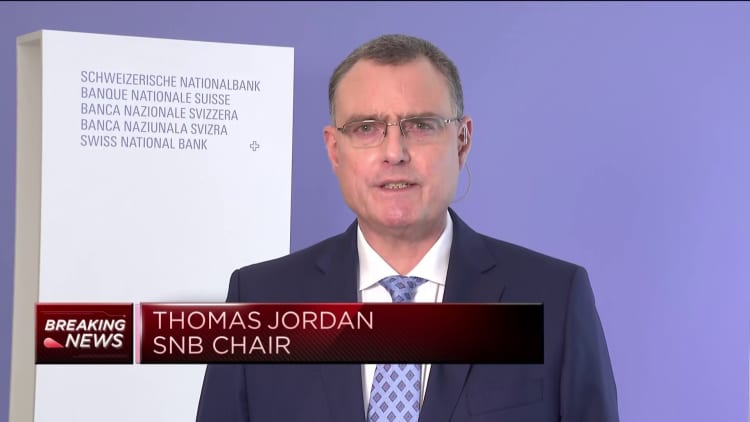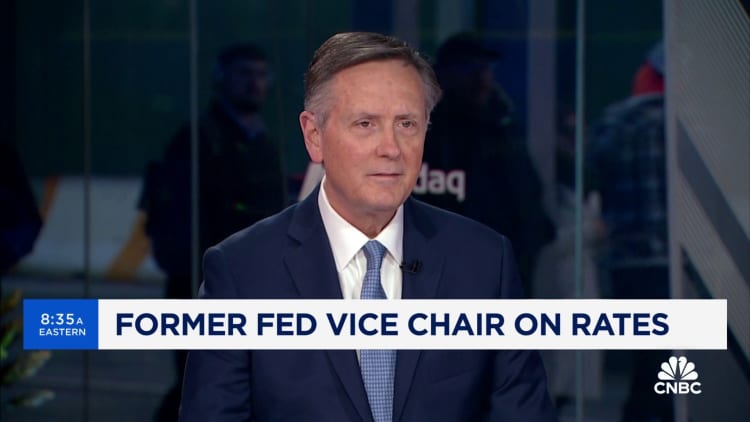U.S. Federal Reserve Chair Jerome Powell holds a press conference following a two-day meeting of the Federal Open Market Committee on interest rate policy in Washington, U.S., March 20, 2024.
Elizabeth Frantz | Reuters
Central banks around the world reached a pivotal point this week, with Switzerland becoming the first major economy to cut interest rates and the Bank of Japan hiking for the first time in 17 years.
Markets are still trying to assess when most of the world’s most influential central banks will begin to unwind the tight monetary policy stances they have adopted over the last two years in a bid to tame sky-high inflation.
Bank of Japan
The Bank of Japan is an outlier, having maintained negative interest rates for 17 years in order to stimulate a stagnant economy and boost inflation. That experiment, along with its unconventional policies of yield curve control and qualitative and quantitative easing, finally ended on Tuesday.
Japan is expecting a spike in wages following ongoing negotiations between unionized employees and Japan Inc, which refers to the country’s highly centralized economic system. BOJ policymakers expect these higher salaries to fuel domestic demand and, in turn, further rises in inflation.
Tomoya Masanao, co-head of Pimco Japan, said the medium- to long-term implications of the shift could be more significant than markets anticipate, with the key question being where Japanese inflation rates will stabilize post-pandemic.

“Though the BOJ reiterated its commitment to the 2% inflation target, it is improbable, in our view, that the BOJ will maintain its accommodative monetary policy indefinitely to solidly achieve its 2% target,” Masanao said.
“The BOJ’s medium-term policy adjustments will likely involve both balance sheet reduction and interest rate hikes. Despite the potential headwinds from a global economic slowdown and rate cuts from other major central banks, the BOJ is poised to reduce its extraordinarily large balance sheet slowly but surely.”
Swiss National Bank
The Swiss National Bank on Thursday surprised the market by cutting its main policy rate by 0.25 percentage points to 1.5%, saying inflation is now likely to stay below 2% for the foreseeable future.
Switzerland’s headline and core consumer price index inflation rates have remained beneath that level since June 2023 and May 2023, respectively, and the central bank revised down its projections to 1.4% by year-end, then 1.2% in 2025 and 1.1% in 2026.
The SNB also noted that the strength of the Swiss franc played into its decision to ease policy.

“To the extent that inflation is falling below 2%, persistent currency strength poses a deflationary risk for the Swiss economy,” strategists at BCA Research said in a note Friday.
“Moreover, a strong CHF reduces the competitiveness of Swiss exports. This is especially true considering that the SNB highlighted weaker global economic activity as the main risk.”
U.S. Federal Reserve
The Federal Reserve on Wednesday held interest rates steady at a range between 5.25%-5.5% as expected, and reiterated its guidance for three 25 basis point interest rate cuts throughout this year.
Market futures are pricing around a 70% chance that the first cut comes at the Fed’s June 11-12 meeting, according to CME Group’s FedWatch tool. The cut expectations remain despite projections of stronger growth, lower unemployment and slightly higher-than-expected core inflation, prompting a slight increase in the central bank’s long-run policy rate forecast.

“The slight rise in the longer-run policy rate forecast is both negligible and noteworthy. It is negligible because market expectations are already much higher, but noteworthy as it reinforces the market’s recent perception that the rate-cutting cycle may be shallower than initially anticipated,” said Whitney Watson, co-head of fixed income and liquidity solutions at Goldman Sachs Asset Management, in a note.
However, GSAM believes that despite “bumps in the inflation road,” major central banks are on track for cuts in the coming months.
Bank of England
The Bank of England on Thursday also held rates steady at 5.25%, but offered a significant dovish signal as the two holdouts on the Monetary Policy Committee dropped their votes for another 25 basis point hike, producing an 8-1 split in favor of the hold, while one member voted to cut.
Governor Andrew Bailey also said the fundamentals were “moving in the right direction” for a cut to interest rates, with U.K. headline inflation falling faster than expected, the labor market cooling and wage growth slowing.
Deutsche Bank U.K. Economist Sanjay Raja highlighted that rate cuts will still leave the bank rate in restrictive territory, but the shifting rhetoric sets the stage for the MPC to begin adjusting the level of restrictiveness as inflation and wage pressures decline.

“The evidence needed to cut rates is less clear. While the MPC noted that ‘a further accumulation of evidence on inflation persistence would be required’ to shift the monetary policy stance, the minutes also acknowledged that members differed ‘on the extent of evidence that was likely to be needed’ for a reduction in Bank Rate,” Raja noted.
Deutsche Bank is sticking to its call for a cut at the Bank’s next meeting on May 9, but “only just,” given the questions marks over the scale and scope of evidence required. However, market futures are pricing only a 25% chance of this, with most economists divided between June and August.

